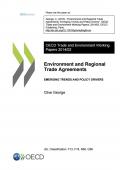This Action Plan provides a framework for the member States of the region to raise energy efficiency in the housing sector and thus enables them to address environmental and economic challenges and meet social needs. The Action Plan lists a range of measures aimed at removing barriers to energy efficiency and progressively moving towards a low-energy and ultimately zero energy and carbon neutral housing sector.
The Action Plan outlines three policy areas for action:
1) Policy area I: energy efficiency governance and financial infrastructure.
2) Policy area II: energy performance standards and technology integration.
3) Policy area III: access to energy efficiency and public housing.

This report examines trends in the use of environmental provisions in Regional Trade Agreements and identifies factors which may explain the presence or absence of these provisions. The report builds on work of the OECD Joint Working Party on Trade and Environment (JWPTE) and includes results of an informal survey of delegates.
Analysis of the environmental provisions in RTAs reveals an encouraging upward trend. While basic provisions remain the most common types found in RTAs, the incidence of more substantive provisions has increased significantly in recent years. Among these, environmental co-operation has been the most common type.
Several factors may have contributed to this evolution. These include countries extending their political mandates for RTAs, for example to include provisions for compliance with multilateral environmental agreements (MEAs), as well as a general accumulation of experience with the use of environmental provisions.
The report includes case studies from Australia, Canada, Chile, the European Union, Japan, New Zealand, United States and Switzerland.
This report highlights the major forces fostering the shift to a resource-efficient green economy in Europe, including the role of EU policies. Currently, the economic and technological changes leading towards green economy objectives across the EU economy are proceeding too slowly; what is required is a much bigger, deeper, and more permanent change in the EU economy and society to create both new opportunities and substitution processes across the economic structure.

Payments for Ecosystem Services (PES) describes the situation where the user of an environmental service, such as water purification, pays the landowners who provide that service. For PES to exist, there must be a clearly defined user and supplier, as well as a number of other necessary conditions, which are defined in this document using a summary of current sources. Particular attention is paid to how these conditions currently obtain within the UNECE region. The range of forest environment services is explored through fourteen detailed case studies, which examine best practice in promoting PES. Political and public relations implications of PES are discussed at length, and recommendations include the need for clarity about where PES may be a useful tool in moving towards a green economy and where other methods may be more appropriate.
As emissions trading schemes (ETS) continue to emerge around the world, governments are starting to consider and implement linkages between their domestic schemes. This paper analyses the case for a link between the EU ETS and the upcoming South Korean ETS. The authors assess key features of the planned South Korean ETS to determine elements that have the potential to facilitate or prevent linkage. The paper draws on lessons from previous linkage examples and makes concrete policy recommendations for the South Korean case. The linkage debate is placed in the larger context of international cooperation on climate change.
